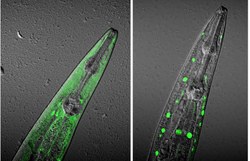Health, demographic change and wellbeing - Ageing with elegans
H2020 SC1 HEALTH
Ageing with elegans is a project funded by the European Commission under the Horizon 2020 Research and Innovation programme based on a collaboration of thirteen academic research groups and four companies from thirteen EU and three non-EU countries (Switzerland, USA, and China). The project started in May 2015 and will run until April 2020. The consortium will validate C. elegans as a healthspan model for better understanding of the factors responsible for healthy ageing, and will develop evidence-based prevention, diagnostic, and therapeutic strategies. The project is coordinated by Katholieke Universiteit Leuven (Prof. Dr. Walter Luyten, Prof. Dr. Liliane Schoofs, Prof. Dr. Liesbet Temmerman, Dr. Geert Depuydt).

This project will develop concepts and methods for using C. elegans as a healthspan model. Already validated extensively as an ageing model, this organism can be readily modified genetically, and effects of environmental manipulations on healthspan can be measured in days or weeks. Once validated as a healthspan model, it can be used for an initial assessment of preventive and therapeutic measures for humans, as well as for risk identification and the initial evaluation of potential biomarkers. It will also prove useful to study interactions between genetic and various environmental factors.
A high-throughput assay for healthspan in C. elegans will be used to conduct a genome-wide RNAi screen for genes affecting healthspan. These genes will be compared with the ones showing under- or over-represented polymorphisms in cohorts of elderly persons who aged exceptionally well. Moreover, the molecular targets of medicinal plants that increase healthspan in C. elegans as well as in mice will be elucidated both in C. elegans as well as mammalian cell systems. In addition, intervention testing as well as target and pathway discovery will include approaches towards identifying best synergistic combinations. From these combined human, C. elegans, mouse and mammalian cell data, molecular pathways affecting healthspan will be derived using (amongst others) advanced data mining methods that involve state-of the-art semantic approaches and network biology tools.
Objectives
The overall objective is to develop and validate Caenorhabditis elegans as a model for healthspan studies. Increased lifespan is not necessarily accompanied by a longer healthspan. This healthspan model can then be used for an initial assessment of preventive and therapeutic measures for humans, as well as for risk identification and the initial evaluation of potential biomarkers. It will also prove useful to study interactions between genetic and various environmental factors.
A panel of C. elegans reporter strains will be created that each have a defect in different pathways affecting healthspan. The discovery of these pathways will be based on
- mining the biomedical literature for genes suggested to be involved in healthspan
- genetic screens of C. elegans for a healthspan phenotype; these screens will be based on RNAi or on the introduction of polymorphisms favouring healthy ageing, discovered in cohorts of healthy aged persons
- testing of pure compounds or botanical preparations to ameliorate healthspan.
Role of Ghent University
Taking advantage of the WorMotel setup, life trajectories of individual animals are followed up by other partners. Candidate genes and compounds will be selected and the Ghent University partner will evaluate locomotion of treated animals as a proxy for general health at each day of their adult life. Out of the results of an RNAi-based screen, genetic modifiers of a disproportionate health/lifespan are selected for in-depth evaluation. Reporter panels (UGent) and omics analyses (other partners) assist in the grouping of healthspan-modifying interventions and reveal relevant molecular changes. Other phenotypic readouts, such as age-related neuronal function or pathogen resistance, are evaluated as well. Taken together, these experiments provide
Contact
Prof. Bart P. Braeckman
Department of Biology
Phone number: ++32.9.264.87.44
E-mail: Bart.Braeckman@UGent.be